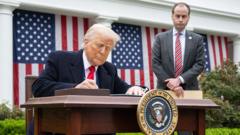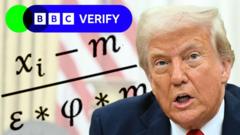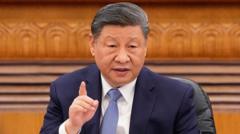President Trump has unveiled a substantial tariff plan targeting various nations, designed to enhance the US economy by imposing a baseline import tariff and higher rates on specific countries. This move, while aimed at protecting domestic jobs, is expected to ignite economic ramifications worldwide.
Trump's New Tariffs: A Global Economic Shift

Trump's New Tariffs: A Global Economic Shift
An overview of President Trump's recently announced tariffs and their anticipated global impacts on trade and economies.
US President Donald Trump has made a significant move by announcing a comprehensive set of tariffs that he believes will foster economic growth within the United States. Announced via executive order, these import taxes are expected to create ripples across the global economy, as Trump argues they are essential for correcting trade imbalances and safeguarding American manufacturing jobs. Here are key components of the newly implemented plan.
**10% Baseline Tariff:**
A senior White House official emphasized that starting April 5, a "baseline" tariff of 10% will apply to all imports into the US. Although the responsibility of paying this tax falls on importers, experts warn it may ultimately affect consumers through higher prices.
**Affected Countries:**
Some nations will only be subject to the baseline rate, including the United Kingdom, Canada, Brazil, and Australia among others. However, certain “worst offenders” will face much steeper tariffs.
**Customized Tariffs:**
The US plans to impose additional tariffs on approximately 60 countries considered habitual violators of fair trade practices. These tariffs, set to take effect on April 9, primarily target the European Union at 20%, China at an eye-popping 54%, and various other nations such as Vietnam and Thailand, with rates ranging from 24% to 49%.
**Exemptions for Canada and Mexico:**
Importantly, the 10% baseline tariff does not extend to Canada and Mexico, as these countries are already encompassed by a series of tariffs established under Trump's previous executive orders due to ongoing border and drug-related issues.
**Automobile Tariffs:**
Moreover, Trump has confirmed a new 25% tariff on all foreign-made automobiles, effective immediately, presenting a considerable shift in vehicle import dynamics.
As global leaders respond, the interconnectedness of international commerce suggests these tariffs will not only influence US trade but will also challenge the economic landscape of nations worldwide, potentially leading to retaliatory measures. As the implications unfold, observers will be closely monitoring the effectiveness and fallout of Trump's tariffs on both American consumers and the broader global economy.






















